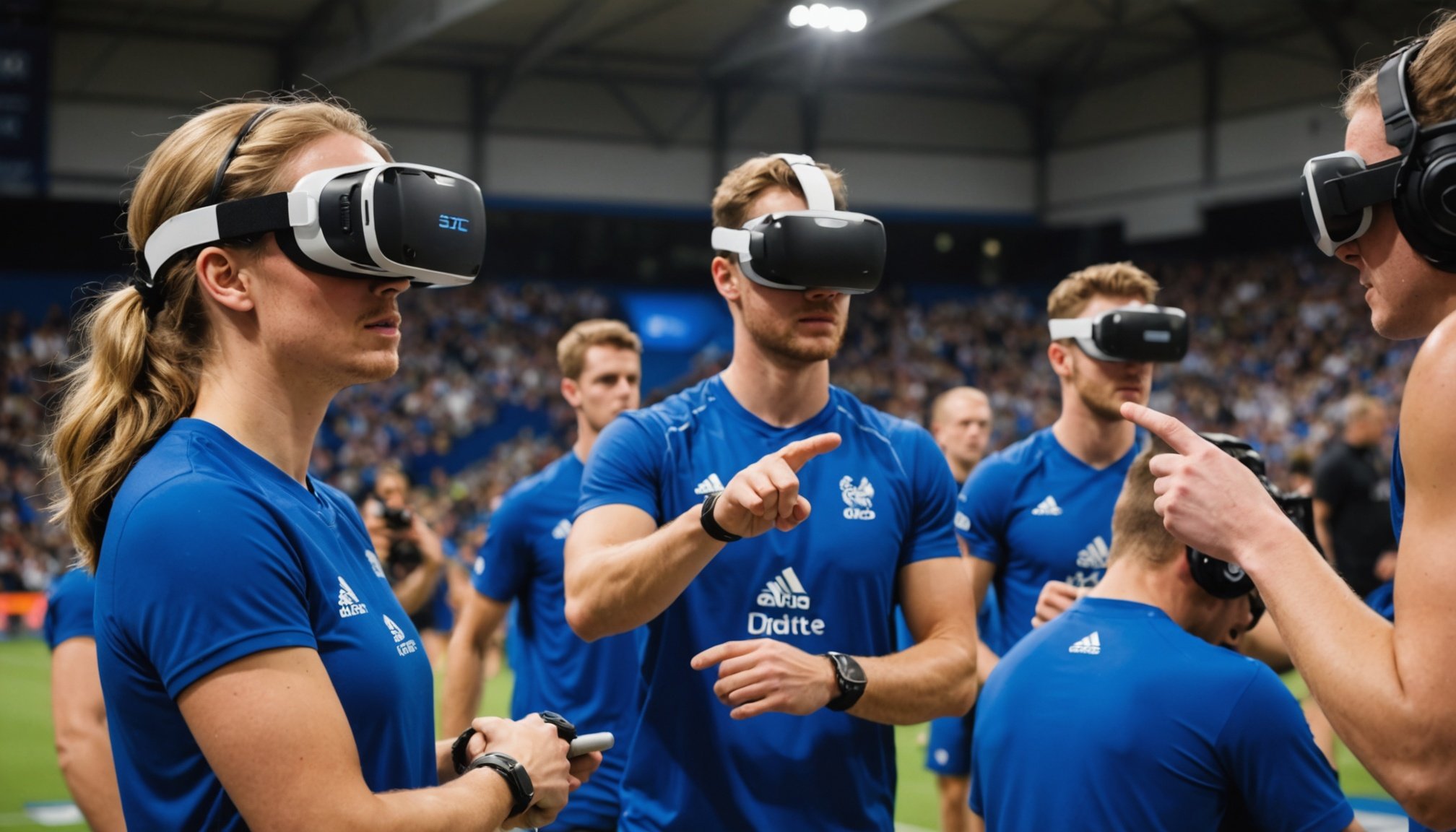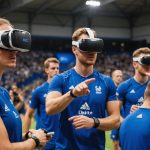Transforming Sports Training: How Virtual Reality is Shaping the Future of UK Athletic Teams
The Rise of Virtual Reality in Sports
Virtual reality (VR) is no longer just a novelty in the sports world; it has become a transformative tool that is revolutionizing the way athletes train, compete, and engage with their sport. In the UK, athletic teams are increasingly embracing VR technology to enhance performance, prevent injuries, and provide immersive training experiences.
The Premier League’s VR Initiative
One of the most significant examples of VR adoption in UK sports is the Premier League’s partnership with Rezzil, a Manchester-based sports technology firm. The Premier League has launched its first official VR game, “Premier League Player,” which allows fans to immerse themselves in the action, recreate legendary goals, and experience historic moments from a player’s perspective. This game, available on Meta Quest VR headsets, features all 20 Premier League clubs and stadiums, enabling players to train, compete in multiplayer modes, and engage in free play[1].
In parallel : Revolutionizing off-season training: cutting-edge techniques for uk sports teams
Enhancing Athlete Performance with VR
VR technology is not just about fan engagement; it is also a powerful tool for athlete performance enhancement. Here are some ways VR is making a difference:
Immersive Training Sessions
VR training sessions offer athletes the opportunity to practice in highly realistic and immersive environments. For instance, Rezzil’s VR tools use sensors and haptic feedback to replicate the sensation of kicking a ball, providing a level of realism that traditional training methods cannot match. This technology is widely used by professional athletes and Premier League clubs to enhance performance through detailed training sessions and match analysis[1].
Also to see : Nurturing grit: effective strategies for uk sports teams to cultivate a culture of endurance and resilience
Data-Driven Insights
VR training integrated with data analytics provides athletes and coaches with valuable insights into performance. Computer vision technology, for example, can analyze player movements in real-time, offering immediate feedback on technique and identifying areas for improvement. This objective performance data eliminates subjectivity, allowing for more accurate training strategies and game plans[4].
Injury Prevention
VR training can also play a crucial role in injury prevention. By analyzing player movements and detecting irregularities in form or posture, AI-powered VR systems can alert athletes and coaches to potential injury risks. This proactive approach helps in preventing injuries and ensuring that athletes can perform at their best without compromising their health[4].
Innovative Fan Engagement
The integration of VR into sports is not only benefiting athletes but also redefining the fan experience.
Virtual Stadium Experiences
The upcoming friendly match between Newcastle United and Adelaide is a prime example of how VR is changing fan engagement. This match will allow fans from around the world to participate virtually using cutting-edge VR headsets, experiencing the game as if they were on the field with their favorite players. This technology bridges the gap between fans and the on-field experience, providing an unprecedented level of engagement and immersion[2].
Environmental Sustainability
The use of VR in sports also addresses environmental concerns associated with international travel. The Newcastle United vs. Adelaide match, for instance, will utilize advanced holographic technology to bring the players together on an augmented reality (AR) pitch, eliminating the need for physical travel between the UK and Australia. This approach sets a precedent for more sustainable international sports events[2].
The Future of Sports: Trends and Predictions
As VR technology continues to evolve, here are some trends and predictions that are shaping the future of sports:
Integration of AI and VR
The combination of artificial intelligence (AI) and VR is expected to revolutionize sports training. AI coaching applications, for example, can provide real-time analysis and feedback, helping athletes optimize their performance. This integration is not limited to professional sports; it is also becoming more accessible for amateur athletes, ensuring that everyone can benefit from cutting-edge training methods[3][4].
Augmented Reality and Hybrid Events
Augmented reality (AR) is also playing a significant role in sports, particularly in the context of hybrid events. The Newcastle United vs. Adelaide match is a pioneering example of how AR can be used to create real-time, interactive environments that blend physical and virtual elements. This trend is likely to grow, making hybrid sporting events a standard rather than a novelty[2].
Digital Transformation and Data Analytics
The sports industry is undergoing a significant digital transformation, with data analytics at its core. VR and AR technologies are generating vast amounts of data that can be analyzed to provide insights into athlete performance, fan behavior, and game strategies. This data-driven approach is enabling teams to make informed decisions, optimize training programs, and enhance overall sports performance[3][4].
Practical Insights and Actionable Advice
For those looking to integrate VR into their sports training or fan engagement strategies, here are some practical insights and actionable advice:
Investing in VR Infrastructure
To fully leverage VR technology, it is crucial to invest in the right infrastructure. This includes high-quality VR headsets, advanced software, and robust data analytics tools. For example, the Meta Quest VR headset has become a popular choice for both consumer and professional VR applications[1][4].
Developing Custom Training Programs
Customized VR training programs can be tailored to meet the specific needs of athletes. By working with sports scientists and coaches, teams can develop VR scenarios that simulate real-game situations, helping athletes prepare more effectively for competitions[3].
Enhancing Fan Engagement Through Social Media
VR experiences can be shared on social media platforms to enhance fan engagement. By providing behind-the-scenes VR content, teams can give fans a unique perspective on the game, fostering a stronger connection between fans and athletes[2].
The integration of virtual reality into sports training and fan engagement is a game-changer for UK athletic teams. From enhancing athlete performance and preventing injuries to providing immersive fan experiences and promoting environmental sustainability, VR technology is opening new avenues for innovation and excellence in the sports industry.
Key Takeaways
- VR Training: Enhances athlete performance through immersive and realistic training sessions.
- Data Analytics: Provides valuable insights into performance, helping in injury prevention and decision making.
- Fan Engagement: Offers unprecedented levels of immersion and interaction, redefining the viewing experience.
- Sustainability: Reduces environmental impact by minimizing the need for physical travel.
- Future Trends: Integration of AI and VR, augmented reality, and digital transformation are set to shape the future of sports.
As VR technology continues to evolve, it is clear that it will play an increasingly vital role in the sports industry. Whether you are an athlete, a coach, or a fan, embracing VR can open up new possibilities for performance, engagement, and sustainability.
Detailed Bullet Point List: How VR is Transforming Sports Training
-
Immersive Training Environments:
-
Simulate real-game scenarios in highly realistic environments.
-
Use sensors and haptic feedback to replicate the sensation of physical actions.
-
Provide immediate feedback on technique and performance.
-
Data-Driven Insights:
-
Analyze player movements in real-time using computer vision technology.
-
Identify strengths and weaknesses, and provide targeted feedback.
-
Eliminate subjectivity in performance analysis.
-
Injury Prevention:
-
Detect irregularities in form or posture during training.
-
Alert athletes and coaches to potential injury risks.
-
Prevent injuries through proactive analysis.
-
Customized Training Programs:
-
Develop VR scenarios tailored to specific athlete needs.
-
Work with sports scientists and coaches to create effective training plans.
-
Simulate various game situations to prepare athletes for competitions.
-
Fan Engagement:
-
Provide immersive VR experiences for fans.
-
Offer behind-the-scenes VR content on social media.
-
Enhance the viewing experience with interactive and immersive elements.
-
Environmental Sustainability:
-
Reduce the need for physical travel through virtual events.
-
Use advanced holographic technology to create AR pitches.
-
Minimize the environmental impact of international sports events.
Comprehensive Table: Comparison of VR Training Tools
| Feature | Rezzil VR | IMPROVR VR | Pro Era VR |
|---|---|---|---|
| Platform | Meta Quest VR headsets | MR-based VR glasses | MetaQuest VR headsets |
| Training Focus | General football skills, match analysis | Brain-based performance training, neuroathletics | American football, quarterback gameplay |
| Technology | Sensors, haptic feedback | MR-based games, brain-based performance analytics | Real-time NFL data, game simulations |
| User Base | Professional and amateur athletes | Professional athletes, expanding to amateur | Professional athletes, particularly American football players |
| Data Analytics | Real-time performance analysis, injury prevention | Detailed brain-based performance metrics | Objective performance metrics, corrective feedback |
| Environmental Impact | Not specifically focused on sustainability | Not specifically focused on sustainability | Not specifically focused on sustainability |
Relevant Quotes
- “We are convinced that this type of virtual training will become indispensable. We even go so far as to say that any athlete who doesn’t use this training will be at a competitive disadvantage,” – Alexander Will, CEO and founder of IMPROVR GmbH[3].
- “The integration of VR and AR in sports necessitates enhanced security measures to protect data and personal information. Innovations in digital security protocols are being prioritized to ensure a secure and seamless experience for participants and viewers alike,” – From the Newcastle United vs. Adelaide match press release[2].
- “With this unique virtual brain-based performance training, IMPROVR goes into areas that cannot be covered by conventional training methods. The hidden potential that lies there is used specifically for the athlete in order to achieve the best possible performance from each athlete,” – Alexander Will, CEO and founder of IMPROVR GmbH[3].
By embracing VR technology, UK athletic teams are not only enhancing their performance but also setting a new standard for innovation and sustainability in the sports industry. As VR continues to evolve, it is clear that it will remain a cornerstone of modern sports training and fan engagement.











